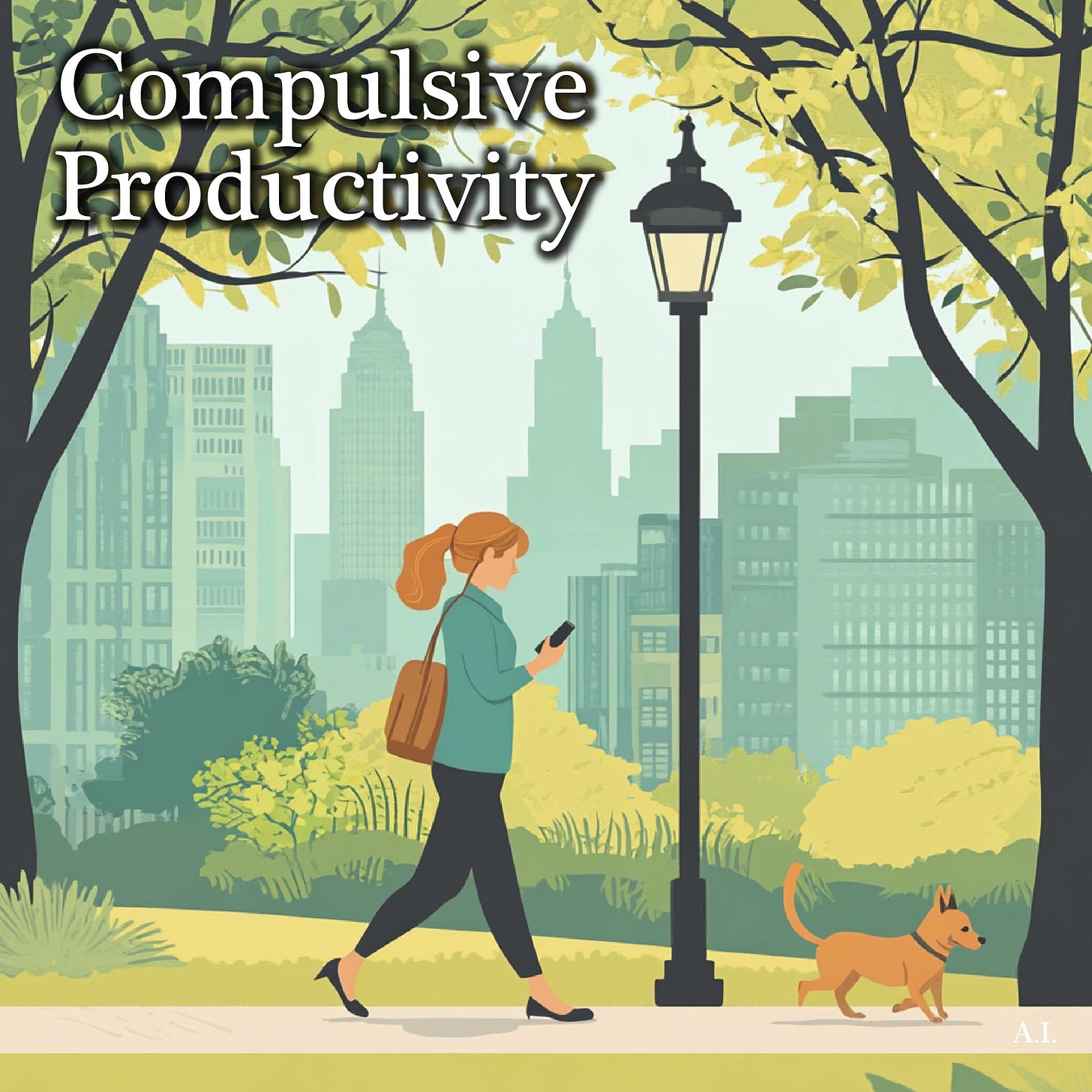We live in an age of compulsive productivity. Everywhere we look there are people trying to be productive, even when they don’t need to be. We’re expected to be productive at work, of course, that’s the name of the game. But what concerns me more is the way in which everyone walking a dog seems to be listening to a podcast, or checking their email and texts. The idea that every minute should be productive is seeping into our time off. And even more worrisome is that we are doing it to ourselves.
This takes many forms. We used to go for walks for our physical and mental health, as well as simple pleasure. Now we count our steps. Fitbits and Apple watches provide a chance to measure all sorts of health data: how long we sleep, how long we have been inactive, some can measure our heart rate. Our health, our physical being, has become a series of scores and metrics, which are compared to how we did last week, or how we are doing compared to other people we have never met. It feels like we are accomplishing something just by going for a walk. That’s the logic of work, now invading our leisure time.
Modern sports has fallen into this trap, too. Just a few years ago, we turned on the TV to watch a game on the weekend as an escape from the world of work. Now when we watch football games, we are encouraged at every opportunity to place bets. This means that not only are the players being measured, but so are we. Before online gambling, there was no way to “fail” by watching a football game. Now, through betting, we can fail or win, depending on how our bets turn out. What should be a chance to escape paid work has become a way to make money, or more likely, lose money. Sports has become like work for those gamble. And for those who don’t gamble, the implication is that we are wasting a chance to make money - that we are being unproductive.
Video games are also now far more like work than play. People enjoy “playing” them, but every action is measured in terms of points, scores or kills. Back when video game technology was first introduced, they promised a chance to escape to ancient cities, and role play as fantasy characters. One could simply get lost and play in a virtual environment. But a few decades later, video games are all about measurement and scoring. Accomplishment and performance is everything. They have become as playful and whimsical as a morning investing in the stock market. Video games are just like work - the rules are created by corporations, and so are the rewards. They may be more fun, but productivity and success are critical.
The ancient Greeks made a distinction between two kinds of time: chronos and kairos. Chronos is what clocks and machines can measure. Kairos, by contrast, is time that is context dependent, it is lived time. Alan Lightman describes kairos as “time created by events, often human events. It might be the opportune moment to take action. Kairos is not necessarily measurable in minutes and hours. It might be the duration of a season, or of a meal, or of a love affair.” Kairos is time that is subjective, experiential, when something feels right. No clock can measure it, or predict it. It is the time humans need to grow - to reach decisions, to have a baby, to end a relationship, to decide we’re ready to change jobs or retire. This kind of time requires leisure and goofing off, time that can’t be counted, and seems wildly unproductive. This is the kind of time that we associate with places like Tuscany or peaceful villages in the developing world. We can have that kind of time right here, too.
What does that leisure look like? It means unplugging from machines that measure us. Turning off the phone, taking off the Fitbit for a while. Taking time to walk without listening to podcasts or accomplishing anything “productive.” Hobbies, singing, dancing, spending time just shooting the breeze with family and friends. Singing in the car. Singing in the rain. Reading a book that has nothing to do with work, but speaks to you. Time spent that will not make a dime, but is ultimately priceless. Time to be human, which cannot be measured, except in the quality of your life. Time worth having. Peace ( and time off) be with you.
Rev. Stephen Milton, Lawrence Park Community Church, Toronto.
Notes:
The Alan Lightman quote came from his book, In Praise of Wasting Time (TED Books) p. 73.
Another good source for understanding the problem with compulsive productivity :
Byung-Chul Han, Vita Contemplativa, (Cambridge 2024)


